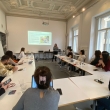Empowering Albanian Youth in Citizen Science: CORYA Study Visit in Vienna
13. Dec. 2024
Beyond Barriers Association (BBA) and the Centre for Social Innovation (ZSI) recently hosted the CORYA Study Visit in Vienna on 3–4 December 2024, bringing together nine participants from Albania to exchange knowledge, enhance professional capacities, and foster collaboration. Organised by the Centre for Social Innovation (ZSI) within the framework of the CORYA project, the visit showcased innovative practices in citizen science, social innovation, and youth-focused initiatives.
CORYA Project is funded by the European Union through the REINFORCING Project Grants. The study visit featured six young researchers and three youth workers from Albania. Through a well-curated agenda, participants gained inspiration and actionable insights to implement in their local contexts.
The first day began at the OEAD – Centre for Citizen Science, where participants attended a presentation by Elisabeth Schauerman (Project Manager, Public Science at OEAD) on the role of citizen science in fostering inclusivity and societal impact. The session emphasised how collaborative research involving communities can produce meaningful and actionable outcomes. A workshop further equipped participants with practical tools to conceptualise and implement citizen-driven projects.
In the afternoon, the agenda shifted to the Centre for Social Innovation (ZSI), where Gorazd Weiss (Senior Expert and Head of the “Research Policy and Development” Department at ZSI) and Elke Dall (Senior Researcher and POLICY ANSWERS Coordinator at ZSI) presented the ORRI projects in the Western Balkans. POLICY ANSWERS is a project dedicated to fostering EU-Western Balkans policy coordination and enhancing the region’s capacity to engage in research and innovation.
Additional projects where ZSI is a partner were also highlighted, including XGain, which promotes sustainable, balanced, and inclusive development across rural, coastal, and urban areas, and MSCAdvocacy, which leverages expertise in research and innovation policy dialogues, Marie Skłodowska-Curie Actions (MSCA) cooperation mechanisms, and stakeholder engagement.
A workshop led by Samire Gurgurovci (Researcher at ZSI) and Carmen Siller (Research Associate at ZSI) engaged participants in a dynamic discussion and interactive exercises, offering practical methodologies for integrating citizen science principles into their work.
The day concluded with an evening tour of Vienna’s renowned Christmas markets, providing participants with an opportunity to enjoy the city’s festive charm and cultural richness.
The second day began with a visit to the Museum of Natural History Vienna (NHM). Participants attended a session led by Silke Schweiger (Curator at NHM), which showcased the museum’s citizen science initiatives aimed at connecting researchers with the public. Iris Ott (Head of Science Communication at NHM) introduced the group to creative approaches in science communication through an interactive session at Deck 50, inspiring participants to consider how similar strategies could be adapted for their own communities.
In the afternoon, the visit to WIENXTRA focused on best practices in youth engagement. Aldo Perez (International Youth Work at WIENXTRA) presented the organisation’s initiatives designed to foster creativity, inclusivity, and intercultural collaboration among young people. This session spurred discussions on how these principles could inspire new approaches in youth programming in Albania.
Participants gained invaluable insights into several key areas:
- The transformative potential of citizen science in promoting community engagement and inclusivity.
- The critical role of social innovation in addressing regional challenges through research-driven solutions.
- The importance of youth-focused initiatives in fostering creativity and global connections.
The study visit underscored the value of international collaboration and provided participants with concrete ideas to enhance their future work.
The next activities of the project include a series of citizen science promotion events in Albanian universities, as well as a two-day workshop in Tirana with ZSI experts on the topic. An e-learning course on citizen science will be the final tool developed through the study visits and the knowledge gained during the one-year project.

























































